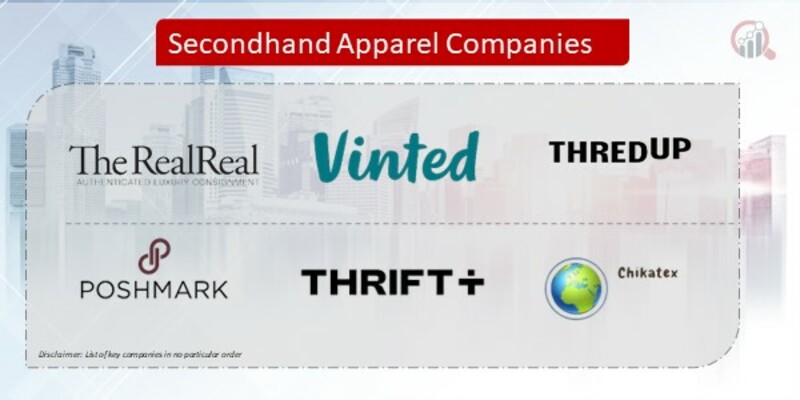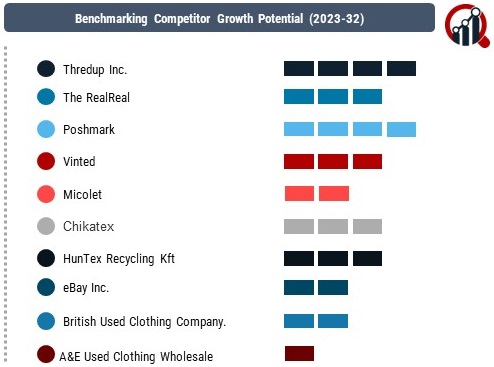Top Industry Leaders in the Secondhand Apparel Market

As the secondhand apparel market continues to gain momentum, new and emerging companies are entering the sector, introducing innovative models and catering to niche consumer preferences. Start-ups like Vestiaire Collective and The RealReal have gained prominence by focusing on the luxury resale segment, offering authenticated, high-quality items. These companies often emphasize the authentication process, building trust within their user communities, and implementing pricing algorithms to align with market demand. The industry is witnessing a shift towards augmented reality (AR) and virtual try-on technologies, prompting new entrants to enhance the online shopping experience and reduce return rates.
Industry news within the secondhand apparel market reflects ongoing trends, technological advancements, and the sector's response to sustainability goals. News related to partnerships with fashion brands, collaborations with influencers, and initiatives promoting circular fashion principles showcases efforts to elevate the profile of secondhand clothing. Moreover, developments in the adoption of blockchain technology for supply chain transparency and authentication are frequently covered in industry news, aligning with the industry's commitment to addressing concerns related to counterfeiting. The market also responds to global events and societal changes, with news covering topics such as the impact of fast fashion criticism on the rise of sustainable resale platforms.
Current investment trends in the secondhand apparel industry underscore a dual focus on technology adoption and market expansion. Key players are directing investments towards the development of advanced algorithms for item curation, enhancing user interfaces, and implementing sustainable packaging solutions. Investments in marketing initiatives, influencer collaborations, and user acquisition strategies are prevalent, reflecting a commitment to building brand awareness and growing user bases. Additionally, strategic investments in logistics and fulfillment capabilities are notable trends as companies aim to streamline operations and provide efficient services to sellers and buyers alike.
The overall competitive scenario in the secondhand apparel market is characterized by established platforms and innovative entrants, each navigating the industry with distinct strategies. Market share analysis considers factors such as platform reputation, authentication processes, and responsiveness to evolving consumer expectations. The industry's responsiveness to sustainability goals, technological advancements, and the integration of social commerce further shapes competitiveness. As consumers increasingly prioritize eco-conscious shopping habits and seek unique, pre-owned fashion items, the secondhand apparel market is poised for continued growth, with companies striving to balance innovation, trust, and environmental responsibility.
In conclusion, the secondhand apparel market's competitiveness is driven by a mix of established players and innovative newcomers. Key players strategically position themselves through expansive offerings, technological advancements, and user engagement strategies. New entrants leverage niche focuses, authentication processes, and augmented reality to carve out their niche. Industry news reflects the dynamic nature of the market, responding to sustainability trends, technological advancements, and shifts in consumer behavior. Current investment trends emphasize technology adoption, market expansion, and a customer-centric approach. The overall competitive scenario underscores the importance of adaptability, innovation, and a nuanced understanding of the multifaceted factors influencing the secondhand apparel market.
Industry News and Investment Landscape
- Recent purchases, such as ThredUp's purchase of Remixd, indicate market trends toward consolidation.
- Expanded expenditures on marketing, technology, and sustainability programs show that participants are dedicated to long-term success.
- Growing partnerships for resale programs with fast-fashion companies demonstrate how widely accepted the sector is.
- Environmental concerns and regulatory developments in favor of secondhand enterprises have the potential to significantly expand the industry.
Key Companies in the Secondhand Apparel Market Include –
- Thredup Inc.
- The RealReal
- Poshmark
- Vinted
- Micolet
- Thrift+
- Chikatex
- HunTex Recycling Kft
- eBay Inc.
- British Used Clothing Company.
- A&E Used Clothing Wholesale
- Mobacotex
- Tradesy
- StockX











